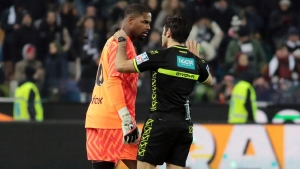Napoli defender Juan Jesus says it is “difficult to comprehend” the decision not to punish Inter Milan’s Francesco Acerbi over allegations of racism.
Brazilian Jesus accused Italy international Acerbi of an abusive comment relating to skin colour during a 1-1 draw between their clubs earlier this month.
But the case was dismissed by a Serie A sports judge on Tuesday due to a lack of evidence.
Jesus feels “very bitter” about the verdict and believes his complaint may have been treated differently if he had not responded “as a gentleman”.
“I have read several times and with great disappointment the decision of the sports judge, who felt there was no evidence that I was the victim of a racist,” said the 32-year-old in a lengthy statement released with his legal representatives.
“While respecting the decision, it is one I find difficult to comprehend and it leaves me feeling very bitter.
“Quite honestly I am crestfallen by such a serious incident in which my only mistake was that I dealt with it ‘as a gentleman’, deciding not to interrupt an important game, with all the inconvenience that would have caused the spectators watching the match.
“I did so believing that such an attitude would have been respected, and perhaps taken as an example.
“Following this decision, I imagine that anyone else finding themselves in a similar situation to mine will act in a very different manner, in order to protect themselves and to curb the disgrace of racism, which, sadly, we are struggling to rid ourselves of.”
According to Jesus, Acerbi apologised on the pitch before changing his version of events the following day.
The 36-year-old Inter player publicly protested his innocence but agreed to withdraw from Italy’s squad for games against Venezuela and Ecuador after discussing the matter with national team manager Luciano Spalletti.
Judge Gerardo Mastrandrea suggested Acerbi’s comments may have been offensive but could not determine whether they were of a racist nature.
Jesus fears the episode could “set a serious precedent for justifying certain behaviour after the event” but expressed hope it may help the football world reflect on the “serious and urgent” issue of racism.
“I really do not understand how ‘go away negro, you’re just a negro’ can be considered to be certainly offensive but not discriminatory,” continued Jesus’ statement.
“I do not understand all the commotion that evening if it really was ‘just an insult’, for which Acerbi himself felt the need to apologise, the referee decided to notify VAR, the match was suspended for over a minute and his team-mates hurried to speak to me.
“I cannot fathom why Acerbi only started to change his version of the events the following day while with the national team, instead of denying it immediately after the match, when it actually happened.
“I didn’t expect it to end like this. I fear – and I hope I am wrong – that this could set a serious precedent for justifying certain behaviour after the event.
“I sincerely hope that this sad matter can help the world of football to reflect on an issue that is both serious and urgent.”
































